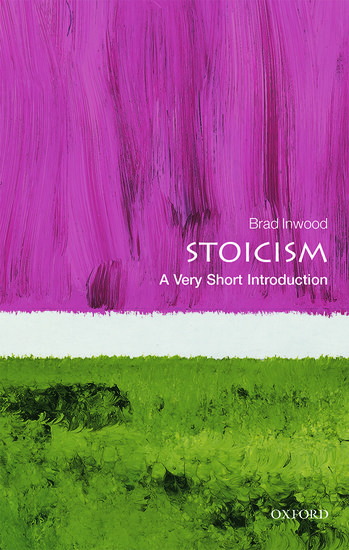Home >
A Very Short Introduction >
Stoicism (Philosophy)
A Very Short Introduction | Philosophy
Stoicism
ISBN: 9780198786665
Series: A Very Short Introduction
Stoicism (Philosophy)
A Very Short Introduction Stoicism (Philosophy) Media > Books > Non-Fiction > Education Books Expect Delays of Up to 4 Weeks| Order Below |
ISBN
9780198786665 (10-digit ISBN: 0198786662)
- Description
- Key Features
- Series Description
- Table of Contents
- Provides an introductory account of Stoic philosophy
- Addresses ancient Stoicism, its enduring legacy, and how the two are connected
- Situates ancient Stoicism in the context of the rest of ancient philosophy
- Offers an account of the reception of Stoic thought in the western tradition
- Considers the place of Stoicism in modern life.
Stoicism is two things: a long past philosophical school of ancient Greece and Rome, and an enduring philosophical movement that still inspires people in the twenty-first century to re-think and re-organize their lives in order to achieve personal satisfaction. What is the connection between them? This Very Short Introduction provides an introductory account of Stoic philosophy, and tells the story of how ancient Stoicism survived and evolved into the movement we see today. Exploring the roots of the school in the philosophy of fourth century BCE Greece, Brad Inwood examines its basic history and doctrines and its relationship to the thought of Plato, Aristotle and his successors, and the Epicureans. Sketching the history of the school's reception in the western tradition, he argues that, despite the differences between ancient and contemporary Stoics, there is a common core of philosophical insight that unites the modern version not just to Seneca, Epictetus, and Marcus Aurelius but also to the school's original founders, Zeno, Cleanthes, and Chrysippus. Inwood concludes by considering the place of Stoicism in modern life.
Oxford's Very Short Introductions series offers concise and original introductions to a wide range of subjects--from Islam to Sociology, Politics to Classics, Literary Theory to History, and Archaeology to the Bible.
Not simply a textbook of definitions, each volume in this series provides trenchant and provocative--yet always balanced and complete--discussions of the central issues in a given discipline or field. Every Very Short Introduction gives a readable evolution of the subject in question, demonstrating how the subject has developed and how it has influenced society. Eventually, the series will encompass every major academic discipline, offering all students an accessible and abundant reference library.
Whatever the area of study that one deems important or appealing, whatever the topic that fascinates the general reader, the Very Short Introductions series has a handy and affordable guide that will likely prove indispensable.
Please note: As this series is not ELT material, these titles are not subject to discount.
1: Ancient Stoicism and modern life
2: Reading Stoics today: Epictetus, Marcus Aurelius and even Seneca
3: The origins of the school: Stoicism and Plato
4: The parts of philosophy: physics
5: The parts of philosophy: ethics
6: The parts of philosophy: logic
7: Conclusion
Further reading
Index
Stoicism is two things: a long past philosophical school of ancient Greece and Rome, and an enduring philosophical movement that still inspires people in the twenty-first century to re-think and re-organize their lives in order to achieve personal satisfaction. What is the connection between them? This Very Short Introduction provides an introductory account of Stoic philosophy, and tells the story of how ancient Stoicism survived and evolved into the movement we see today. Exploring the roots of the school in the philosophy of fourth century BCE Greece, Brad Inwood examines its basic history and doctrines and its relationship to the thought of Plato, Aristotle and his successors, and the Epicureans. Sketching the history of the school's reception in the western tradition, he argues that, despite the differences between ancient and contemporary Stoics, there is a common core of philosophical insight that unites the modern version not just to Seneca, Epictetus, and Marcus Aurelius but also to the school's original founders, Zeno, Cleanthes, and Chrysippus. Inwood concludes by considering the place of Stoicism in modern life.
Key Features
- Provides an introductory account of Stoic philosophy
- Addresses ancient Stoicism, its enduring legacy, and how the two are connected
- Situates ancient Stoicism in the context of the rest of ancient philosophy
- Offers an account of the reception of Stoic thought in the western tradition
- Considers the place of Stoicism in modern life.
Series Description
Oxford's Very Short Introductions series offers concise and original introductions to a wide range of subjects--from Islam to Sociology, Politics to Classics, Literary Theory to History, and Archaeology to the Bible.
Not simply a textbook of definitions, each volume in this series provides trenchant and provocative--yet always balanced and complete--discussions of the central issues in a given discipline or field. Every Very Short Introduction gives a readable evolution of the subject in question, demonstrating how the subject has developed and how it has influenced society. Eventually, the series will encompass every major academic discipline, offering all students an accessible and abundant reference library.
Whatever the area of study that one deems important or appealing, whatever the topic that fascinates the general reader, the Very Short Introductions series has a handy and affordable guide that will likely prove indispensable.
Please note: As this series is not ELT material, these titles are not subject to discount.
EASY ORDER FORM
PRICES LISTED INCLUDE CONSUMPTION TAX
Price Before Tax:
¥1,790


